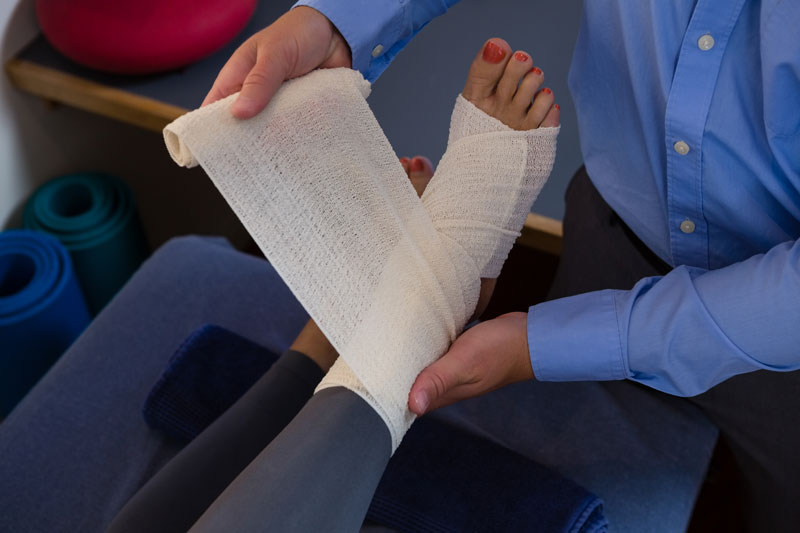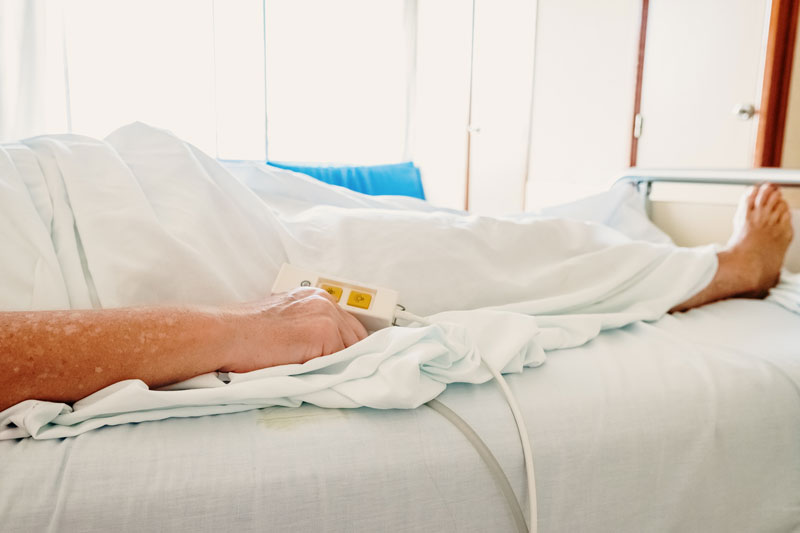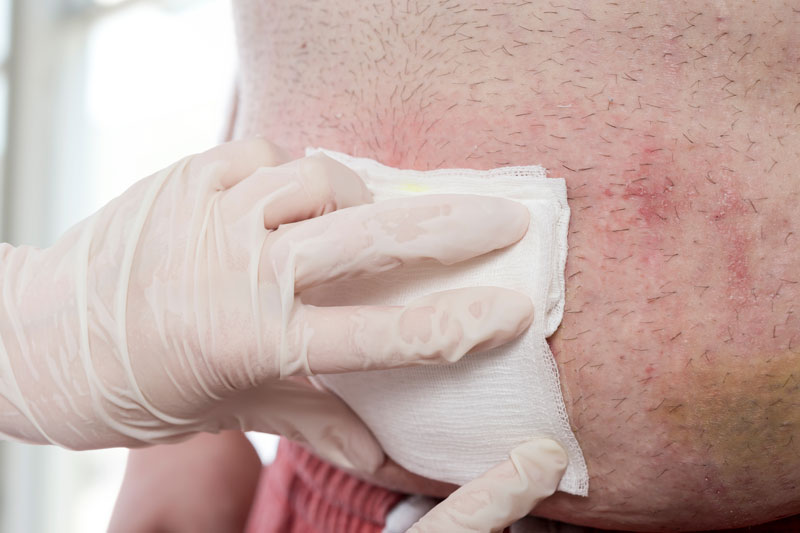What are Diabetic Ulcers?
What Causes Diabetic Ulcers?
Symptoms of Diabetic Ulcers
Diabetic ulcers often present with specific signs and symptoms that warrant immediate attention and care. If you have diabetes, it is crucial to be vigilant and watch for the following indications of diabetic ulcers:
- Persistent Redness: The affected area may exhibit persistent redness or discoloration, indicating a potential wound.
- Open Sores or Wounds: Diabetic ulcers typically manifest as open sores or wounds, which may vary in size and depth.
- Drainage or Fluid: The ulcer site might produce drainage or fluid, which can be clear, yellow, or cloudy.
- Odor: A foul odor emanating from the wound could indicate infection.
- Tenderness or Pain: The affected area may be tender to the touch or painful.
- Lack of Sensation: Diabetic neuropathy can cause reduced or absent sensation in the extremities, making it challenging to detect ulcers at an early stage.
- Swelling: Swelling around the wound site may be present, indicating inflammation or infection.
- Warmth: The area surrounding the ulcer might feel warm to the touch, suggesting possible infection.
- Advanced Wound Healing Modalities: Employing growth factors, cellular therapies, or skin substitutes to enhance healing in complex cases.
If you experience any of these symptoms, seeking prompt evaluation and treatment from our expert wound care professionals at Mobile Wounds is essential to prevent complications and promote successful wound healing.
Treatment Options for Diabetic Ulcers
Effective management of diabetic ulcers involves a comprehensive and individualized approach to promote healing and prevent complications. At Mobile Wounds, our affiliated practices offer a range of advanced treatment options tailored to each patient’s specific needs. The following are some of the key treatment options for diabetic ulcers:
- Wound Debridement: Removing dead or infected tissue from the ulcer to facilitate the healing process.
- Offloading: Reducing pressure on the affected foot through the use of specialized footwear, casts, or braces to promote wound closure.
- Topical Dressings: Applying specialized dressings to create a moist wound-healing environment and protect the ulcer from infection.
- Negative Pressure Wound Therapy (NPWT): Using controlled suction to promote blood flow and wound healing.
- Advanced Wound Healing Modalities: Employing growth factors, cellular therapies, or skin substitutes to enhance healing in complex cases.
- Infection Management: Administering topical or systemic antibiotics to control or prevent infection in the ulcer.
- Total Contact Casting (TCC): Using TCC to distribute weight evenly and reduce pressure on the ulcer site for faster healing.
Our team of skilled wound care professionals at Mobile Wounds is committed to providing the highest standard of care for diabetic ulcers, leveraging the latest advancements in wound management to ensure optimal outcomes for our patients. We prioritize individualized treatment plans to address each patient’s unique needs and support their journey to improved wound healing and overall well-being.
Frequently Asked Questions about Diabetic Ulcers
1. How do I know if I have a diabetic ulcer?
Diabetic ulcers may manifest as persistent redness, open sores, or wounds, particularly on the feet or lower extremities. If you have diabetes and notice any of these symptoms, it is crucial to seek immediate medical evaluation, especially if you also experience tenderness, warmth, drainage, or an unpleasant odor from the affected area. Since diabetic neuropathy can reduce sensation, regular foot inspections and vigilance are essential to detect ulcers early and prevent complications.
2. Can I treat a diabetic ulcer at home?
While basic wound care at home, such as keeping the area clean and applying over-the-counter antiseptic ointments, may be helpful for minor wounds, diabetic ulcers require specialized medical attention. Proper management involves a team of experienced wound care professionals who can tailor treatment plans based on individual needs. Delaying or inadequate treatment can lead to serious complications, so seeking professional care at the earliest sign of an ulcer is crucial.
3. Can diabetic ulcers lead to serious complications?
Yes, diabetic ulcers can lead to severe complications if left untreated or improperly managed. These complications may include infection, which can spread to bones or adjacent tissues (cellulitis) and may even lead to sepsis, a life-threatening condition. Additionally, poorly healing ulcers can develop into chronic wounds that require advanced interventions like amputation. Early diagnosis, expert wound care, and diligent foot care practices are essential to minimize the risk of complications associated with diabetic ulcers.
4. How can I prevent diabetic ulcers?
Preventing diabetic ulcers involves proactive self-care and adherence to diabetes management. Key preventive measures include:
- Regular foot inspections to detect any signs of injury or abnormalities.
- Wearing appropriate, well-fitting shoes with cushioning and support.
- Maintaining well-controlled blood sugar levels to promote optimal wound healing.
- Stopping smoking to improve circulation and overall health.
- Engaging in regular physical activity to improve blood flow and maintain overall health.
- Additionally, seeking regular foot examinations and diabetic education from healthcare professionals can further reduce the risk of diabetic ulcers.
5. Are there any lifestyle changes I can make to improve diabetic ulcer healing?
Yes, certain lifestyle changes can support diabetic ulcer healing. Adhering to a well-balanced diet, rich in nutrients like protein, vitamins, and minerals, can promote wound healing. Managing blood sugar levels through proper diet, exercise, and medications as prescribed by your healthcare provider is also vital. Avoiding smoking and alcohol consumption is recommended, as both can hinder the body’s natural healing processes. Most importantly, follow your healthcare team’s guidance and attend regular wound care appointments to optimize healing and prevent complications.







